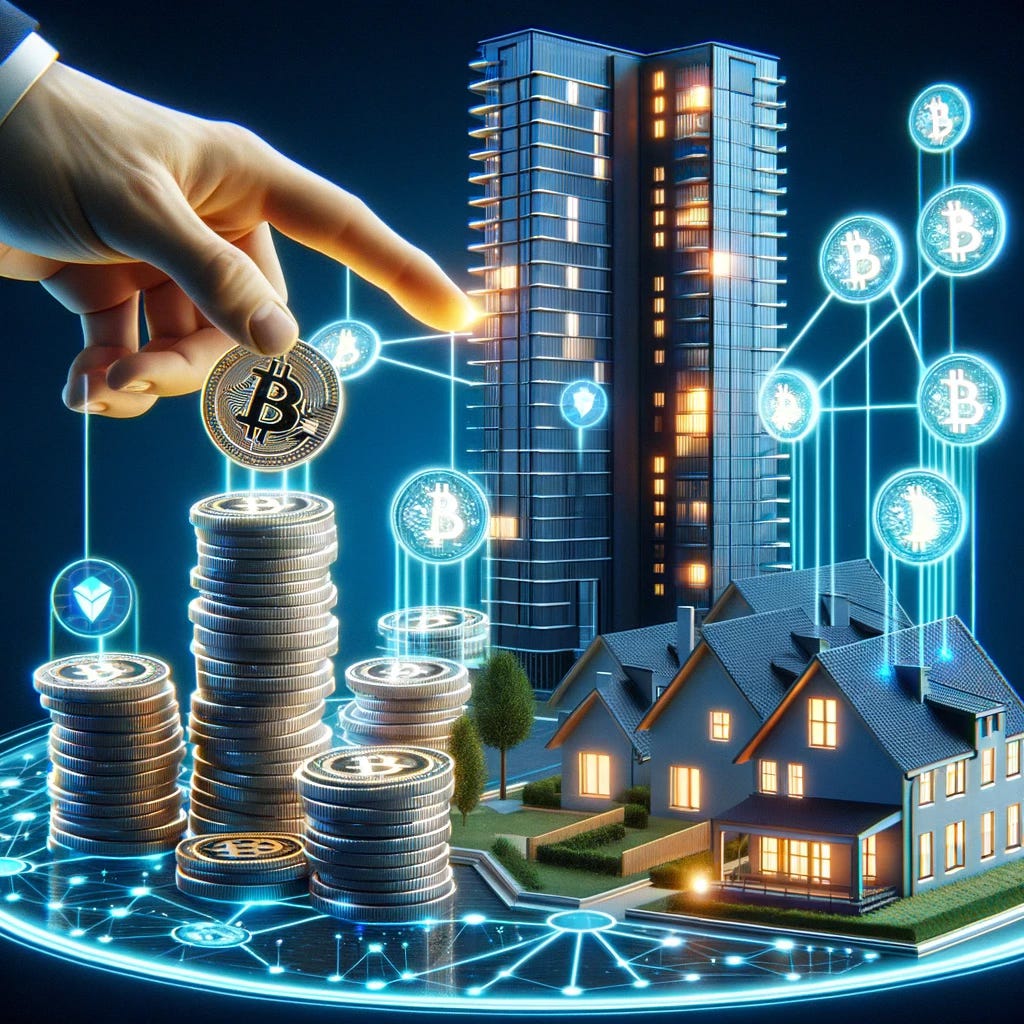Real Estate Tokenization - Part 1
Intro to Blockchain, Tokens, and the South Sea Bubble
Lessons From The British Empire
Strange as it may sound, the Tokenization of Real Estate has its roots in the British Empire of the early 1700s.
Early, perhaps the first, examples of fractional ownership and securitization came out of this era when the British Government, by Act of Parliament and with the blessing of King George, sold shares in the South Sea Company to finance trade and to monetize government debt.
The South Sea Company came to prominence on the back of Crown-sponsored, despicable trade practices and decades of war on multiple fronts that eventually ended with the South Sea Bubble of 1720.
As the story goes, even Sir Issac Newton (the brilliant gravity guy) fell victim to the mania and groupthink 200 years before Charles Ponzi would execute his scheme.
The collapse highlighted the importance of understanding the core principles of investing and the fundamental need for a framework of government regulation for all innovative investment techniques.
The Importance of a Regulatory Framework
As we discuss the new wave of real estate ownership, remember to do your homework, use common sense, and invest for the long term.
Turning hard assets (homes and buildings) into financial assets (tokens and shares) increases the fungibility of the assets, the ease of trading, record-keeping, and the speed of transacting.
A system of rules and a compliance framework leads to trust in the marketplace and broader acceptance of any new asset class.
The Example of Fine Art
Consider a work of art purchased from a Sotheby’s auction versus an unknown art dealer.
In almost all cases, the provenance of the Sotheby’s purchase will be accurate and accepted, and the piece will be eligible for insurance and easy to trade. Less so for the piece acquired from the unknown dealer.
The same holds true for the Tokenization of Real Estate. A rules-based framework will lead not only to growth in the market but also increase confidence in the estimates of the value of the underlying assets.
In summary, while the South Sea Bubble and real estate tokenization are products of very different eras and technologies, they share similarities in the speculative nature of the investments, the enhancement of liquidity and market accessibility, as innovative financial instruments to attract a broader range of investors.
The Bubble left a lasting legacy of skepticism toward speculative investments, particularly among less sophisticated investors. Yet, it set the floor upon which regulated financial markets could be built.
Understanding Real Estate Tokenization
Defining: Fractional Ownership and Securitization
Fractional Ownership
The definition of fractional ownership is quite simple. Think of breaking an asset into pieces so that many people can share ownership of the asset.
Each owner has a direct share in the property, and the value of that share changes as the asset appreciates or depreciates.
Not a perfect example, but think of shares of stock or a mutual fund composed of direct ownership of homes and buildings.
Securitization
Securitization is the process of gathering loans or other assets representing ownership that may generate income, bundling them together, and turning them into a new type of security that can be sold to investors.
Think of a bond that represents a lending relationship and rights to a stream of income.
The Concept of Real Estate Tokenization
Tokenization means the conversion of real estate assets into digital tokens (fractions), which are then attached to and traded on the blockchain.
The process of tokenization allows for fractional ownership of properties.
Each share or fractional ownership right is represented in the form of a token (think poker chip) that is in digital form.
This digital token is entered into a record or bank ledger of sorts known as the blockchain.
What is Blockchain?
Think of blockchain as a digital ledger or record-keeping system that's shared among many people all over the internet.
It's like an extensive, secure database where numerous players/machines (nodes) simultaneously and independently verify the accuracy and authenticate each entry into the ledger.
Multiple copies of the database are stored on separate servers across the internet, such that if one copy is corrupted or compromised, the replicas exist to exert authority and maintain the proper order and accuracy of the ledger.
The terms "distributed network" or "decentralized application (DAPP)" are fundamental concepts.
Each entry in this database is called a "block," it contains information about a specific transaction or group of data, like who sent money to whom or who owns a particular property. Stringing blocks together form a chain - the blockchain.
To summarize, an asset (house or commercial building) is broken into many ownership pieces (tokens), which are recorded in a digital ledger (blockchain).
Real estate tokenization is a process where property ownership is converted into digital tokens on a blockchain.
These tokens represent a share or a stake in real estate assets and can be bought and sold on digital platforms. This method uses blockchain technology to create a secure and transparent way to fractionalize ownership, making real estate investment more accessible to a broader range of investors.
Enthusiasts argue that the fractional ownership model democratizes real estate investment, enabling individuals to invest in properties that were previously out of reach due to cost and complexity.
Understanding Blockchain Technology in Real Estate
In real estate, blockchain can be used to record property ownership, transactions, and other pertinent information.
For example, when someone buys or sells a property, the transaction can be recorded on the blockchain, providing a secure record of ownership.
Benefits of Real Estate Tokenization
One of the key benefits of real estate tokenization is the potential for increased liquidity. Traditional real estate investments often lack liquidity, as properties can take time to sell and require significant capital to acquire.
With tokenization, investors can trade their tokens on secondary markets, providing increased liquidity and flexibility.
Enhanced Accessibility for Property Owners and Investors
Real estate tokenization opens up investment opportunities to a broader audience by dividing properties into tokens.
Investors no longer need large sums of capital to participate in real estate markets. Instead, they can purchase tokens representing fractional ownership, allowing for more diversified portfolios and reduced investment barriers.
Security
Blockchain technology, the underlying technology behind real estate tokenization, offers enhanced security. All transactions are recorded on a decentralized ledger, providing a tamper-proof record of ownership and transactions. This distributed nature of the blockchain reduces the risk of fraud and improves trust among investors.
Lower Entry Costs
Traditional real estate investments often require significant upfront costs, including legal fees, property management expenses, and maintenance costs.
Real estate tokenization reduces these entry costs by allowing investors to buy fractional ownership stakes in properties. This lower barrier to entry enables more investors to participate in real estate markets.
Global Investment Opportunities
Real estate tokenization unlocks access to global real estate markets. Investors can diversify their portfolios by investing in properties around the world without the need for extensive legal and regulatory compliance. This global reach opens up new investment opportunities and reduces geographic limitations for investors.
This innovative approach should not be confused with speculation on Bitcoin or other digital currencies, primarily because it fundamentally pertains to tangible assets and property rights.
Toward an Efficient Market
Tokenization in real estate represents a shift toward a more granular, divisible, and accessible ownership of physical properties. Each token corresponds to a specific share of a property, backed by real-world value—be it a residential building, commercial space, or land. This direct link to a tangible asset grounds the tokens’ value.
Regulatory frameworks must continue to evolve such that tokens comply with laws concerning property ownership, financial reporting, and investor protection.
In summary, real estate tokenization is fundamentally about access to property investment and managing real assets through a modern technological approach.
Coming Up - Part 2
Crowdfunding and Advanced Concepts in Real Estate Tokenization
About The Author And Podcast Host
Tom Levine, leveraging a 25-year tenure in capital markets, leads Zero Hour Group and Native Angelino Real Estate, offering a suite of consulting, strategic analysis, and real estate services.
An alumnus of USC Marshall School of Business and the Claremont Colleges - Pitzer College campus with a term at the London School of Economics. Additionally, he holds a CADRE broker's license (#02052698) and the designation certified Short Sale Specialist under the National Association of Realtors.
Have a challenging transaction? Let's discuss.
I consult on a range of transaction types and deal structures.





